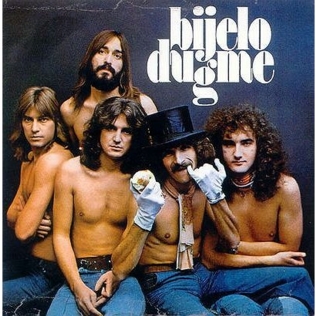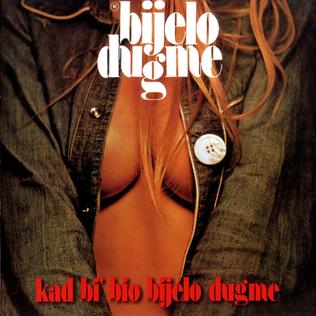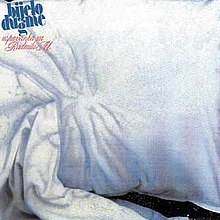
Goran Bregović is a recording artist from Bosnia and Herzegovina. He is one of the most internationally known modern musicians and composers of the Slavic speaking countries in the Balkans, and is one of the few former Yugoslav musicians who has performed at major international venues such as Carnegie Hall, Royal Albert Hall and L'Olympia.

Želimir "Željko" Bebek is a Bosnian-Croatian vocalist and musician most notable for being the lead singer of the Yugoslav rock band Bijelo Dugme from 1974 until 1984. He has since maintained a successful folk-pop solo career.

Bijelo Dugme was a Yugoslav rock band, formed in Sarajevo, SR Bosnia and Herzegovina in 1974. Bijelo Dugme is widely considered to have been the most popular band ever to exist in the former Socialist Federal Republic of Yugoslavia and one of the most notable acts of the Yugoslav rock scene and Yugoslav popular music in general.

Šta bi dao da si na mom mjestu is the second studio album from influential Yugoslav rock band Bijelo Dugme, released in 1975.

Eto! Baš hoću! is the third studio album by Yugoslav rock band Bijelo Dugme, released in 1976.

Bitanga i princeza is the fourth studio album by Yugoslav rock band Bijelo Dugme, released in 1979.

Doživjeti stotu is the fifth studio album by Yugoslav rock band Bijelo Dugme, released in 1980.

Koncert kod Hajdučke česme is the first live album by Yugoslav rock band Bijelo Dugme, released in 1977. The album's title refers to the band's famous concert played on August 28, 1977 near Hajdučka česma grounds at Košutnjak Park in Belgrade. However, the material on the record is only partially recorded at the said event.

Ćiribiribela is the ninth and final studio album by Yugoslav rock band Bijelo Dugme, released in 1988. Bijelo Dugme would split-up in 1989, and Ćirbiribela would be the band's last release before the band's 2005 reunion and the live album Turneja 2005: Sarajevo, Zagreb, Beograd.

Bijelo Dugme is the seventh studio album by Yugoslav rock band Bijelo Dugme, released in 1984. Due to Bijelo Dugme's usage of Uroš Predić's famous painting Kosovo Maiden for the album cover, the album is unofficially known as Kosovka djevojka.

Pljuni i zapjevaj moja Jugoslavijo is the eighth studio album by Yugoslav rock band Bijelo Dugme, released in 1986.

Kad bi' bio bijelo dugme is the 1974 debut studio album from influential Yugoslav rock band Bijelo Dugme.

Mramor, kamen i željezo is the third live album by Yugoslav rock band Bijelo Dugme, released in 1987. Originally released as a double album, the material was recorded throughout 1987 during the band's tour in support of their Pljuni i zapjevaj moja Jugoslavijo album.
Vladimir "Vlado" Pravdić was a Bosnian musician who was the organist of the Yugoslav rock group Bijelo Dugme from 1974 to 1976 and again from 1978 to 1987.

Goran Bregović is a self-titled album by Bijelo dugme's frontman Goran Bregović, released in 1976 in-between the band's second and third studio albums.

Turneja 2005: Sarajevo, Zagreb, Beograd is the fourth live album by Yugoslav rock band Bijelo Dugme, released in 2006. The album was recorded on Bijelo Dugme's 2005 reunion tour, and is the band's first release since the 1988 studio album Ćiribiribela.

Stižemo is an album by Serbian and Yugoslav keyboardist Laza Ristovski and Yugoslav drummer Ipe Ivandić, released in 1978.

Hobo was a Yugoslav progressive rock band formed in Zagreb in 1972. Formed and led by keyboardist Mato Došen, Hobo was a prominent act of the 1970s Yugoslav rock scene.

Grupa Marina Škrgatića was a Yugoslav progressive rock band formed in Zagreb in 1970. Fronted by vocalist and trombonist Marin Škrgatić, the group was a prominent act of the 1970s Yugoslav rock scene.

New Partisans was a short-lived mid-1980s movement on the Yugoslav rock scene. The term was used to denote albums by Sarajevo-based bands Bijelo Dugme, Plavi Orkestar and Merlin which were characterized by pop rock and power pop sound with elements of folk music and lyrics and imagery heavily inspired by Yugoslav Partisans and Yugoslavism.



















